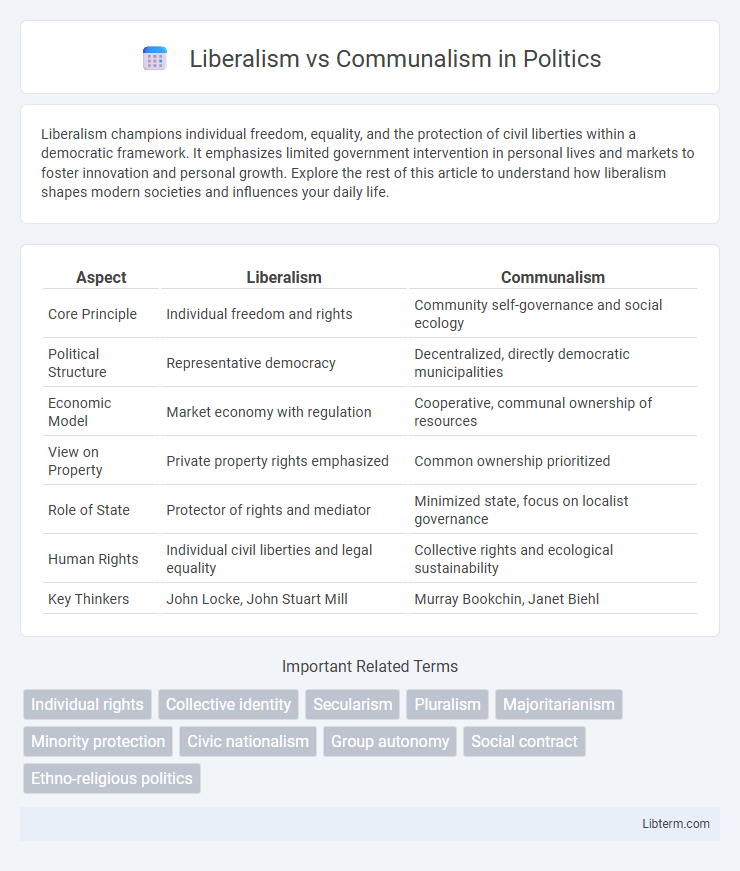Liberalism champions individual freedom, equality, and the protection of civil liberties within a democratic framework. It emphasizes limited government intervention in personal lives and markets to foster innovation and personal growth. Explore the rest of this article to understand how liberalism shapes modern societies and influences your daily life.
Table of Comparison
| Aspect | Liberalism | Communalism |
|---|---|---|
| Core Principle | Individual freedom and rights | Community self-governance and social ecology |
| Political Structure | Representative democracy | Decentralized, directly democratic municipalities |
| Economic Model | Market economy with regulation | Cooperative, communal ownership of resources |
| View on Property | Private property rights emphasized | Common ownership prioritized |
| Role of State | Protector of rights and mediator | Minimized state, focus on localist governance |
| Human Rights | Individual civil liberties and legal equality | Collective rights and ecological sustainability |
| Key Thinkers | John Locke, John Stuart Mill | Murray Bookchin, Janet Biehl |
Introduction to Liberalism and Communalism
Liberalism emphasizes individual rights, freedom, and equality as foundational principles, advocating for limited government intervention to protect personal liberties and promote free markets. Communalism prioritizes collective ownership, social equality, and community decision-making, often rejecting capitalist structures in favor of cooperative governance and shared resources. Both ideologies address human freedom and social organization but diverge significantly in their approaches to property, governance, and individual versus collective priorities.
Historical Origins and Development
Liberalism emerged in the 17th and 18th centuries during the Enlightenment, emphasizing individual rights, private property, and political freedoms rooted in thinkers like John Locke and Montesquieu. Communalism developed in response to the inequalities of capitalism, drawing from socialist and anarchist traditions, notably inspired by Murray Bookchin's ecological and direct democracy principles in the late 20th century. While liberalism promotes market economies and individualism, communalism advocates for decentralized, community-based governance and collective ownership.
Key Philosophical Foundations
Liberalism is grounded in the principles of individual freedom, private property rights, and limited government intervention, emphasizing rationality, equality before the law, and free-market capitalism. Communalism centers on collective ownership, direct democracy, and social equality, drawing inspiration from anarchist and socialist traditions to promote an ecological, community-based approach to governance. Both ideologies fundamentally differ in their views on individual autonomy versus communal responsibility as the basis for social organization.
Individual Rights vs Collective Identity
Liberalism emphasizes individual rights, advocating for personal freedom, autonomy, and legal protections that secure individual interests within society. Communalism prioritizes collective identity, promoting shared values, social cohesion, and community-based decision-making as fundamental to societal well-being. The tension between these frameworks centers on balancing personal liberty with the needs and responsibilities of the community.
Political Implications and Governance
Liberalism emphasizes individual rights, free markets, and representative democracy, shaping governance models that prioritize personal freedoms and limited state intervention. Communalism advocates for decentralized, community-based governance with direct democracy and collective ownership, challenging centralized political power structures. These contrasting political implications influence policy-making, with liberalism favoring privatization and civil liberties, while communalism supports social equality and participatory decision-making.
Economic Perspectives: Liberalism vs Communalism
Liberalism emphasizes free markets, individual property rights, and limited government intervention to drive economic growth and innovation. Communalism advocates for collective ownership of resources and cooperative management to achieve economic equality and social welfare. While liberalism prioritizes competition and personal wealth accumulation, communalism focuses on shared prosperity and community decision-making in economic matters.
Social Justice and Equality Approaches
Liberalism emphasizes individual rights and equal opportunity, advocating for social justice through legal protections and market-based equality measures. Communalism prioritizes collective well-being and direct democracy, promoting social justice by restructuring society around community ownership and shared resources. Both frameworks seek equality but diverge in methods: liberalism relies on institutional reforms, while communalism demands systemic societal transformation.
Contemporary Examples and Case Studies
Contemporary liberalism emphasizes individual rights, free markets, and democratic governance, exemplified by the United States' capitalist economy and multi-party political system promoting personal freedoms and economic competition. Communalism, rooted in collective ownership and social equality, is demonstrated in Kerala, India, where decentralized governance and community-led initiatives have enhanced social welfare and local empowerment. Case studies reveal liberal societies prioritize privatization and global integration, while communalist models focus on local autonomy and cooperative resource management to address social and environmental challenges.
Criticisms and Challenges
Liberalism faces criticism for promoting individualism that can undermine community cohesion and exacerbate social inequalities, often neglecting collective responsibilities and cultural diversity. Communalism is challenged by its potential to prioritize group identity over individual rights, risking authoritarianism and social fragmentation. Both ideologies struggle to balance personal freedoms with social justice, leading to debates on effective governance and equitable resource distribution.
Future Prospects and Relevance
Liberalism's emphasis on individual rights, free markets, and democratic governance offers adaptability to technological advancements and global interconnectedness, ensuring its continued influence in shaping economic and political policies worldwide. Communalism's focus on local self-governance, ecological sustainability, and social equity presents a viable response to climate change and social fragmentation, gaining relevance in grassroots movements and alternative governance models. Future prospects for both ideologies depend on integrating liberal democratic institutions with communal efforts toward decentralization and environmental stewardship, potentially creating hybrid systems responsive to 21st-century challenges.
Liberalism Infographic

 libterm.com
libterm.com